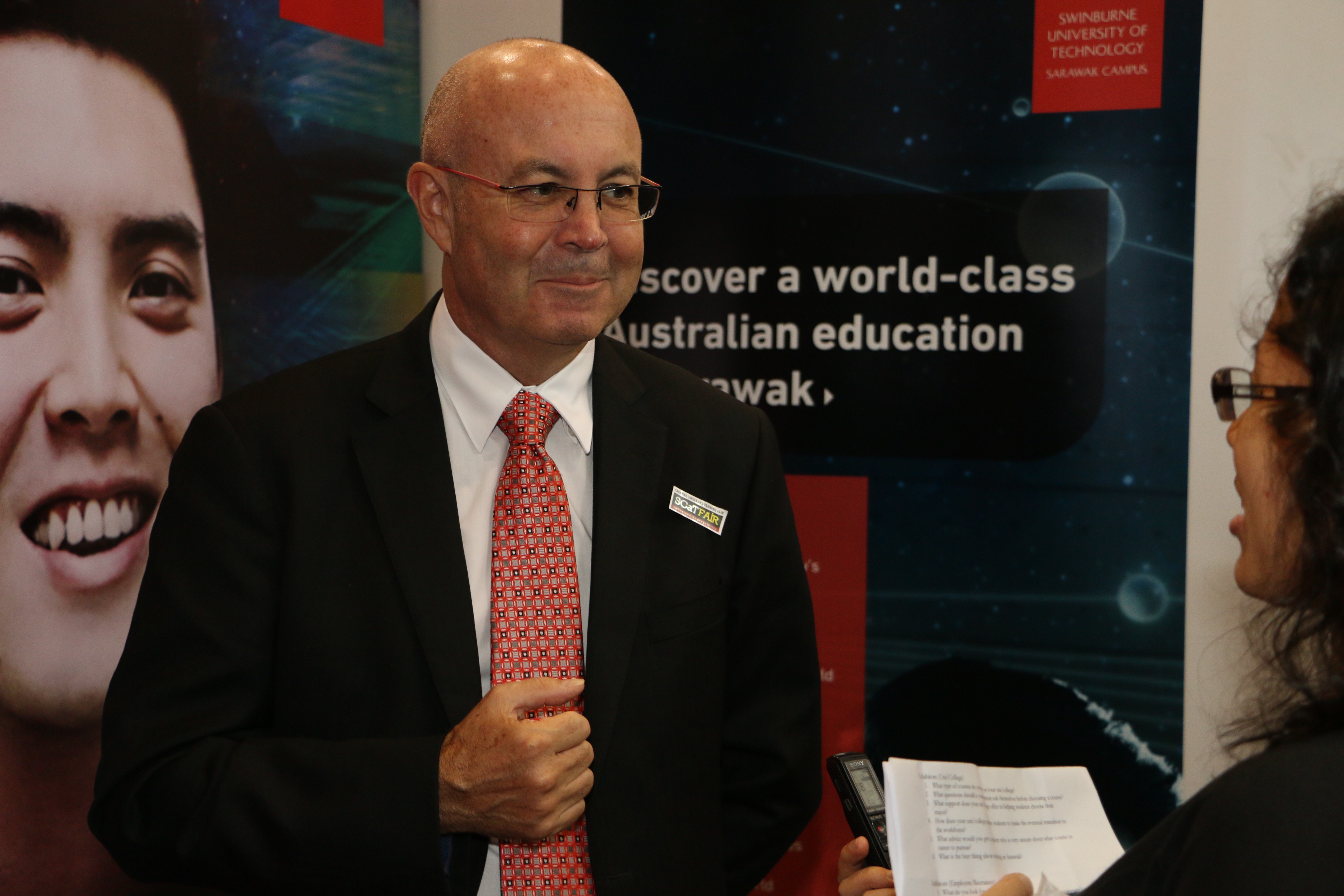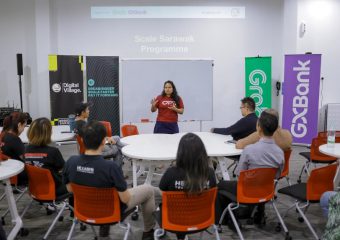Choosing a university major and deciding what career path to take can often be challenging for many people. At the recent SCaT Fair 2015, SarawakYES! spoke to several academics from educational institutions across Sarawak to understand more about what they offer, and to listen to their tips for students.
Below is our latest interview:
Q: Please introduce yourself.
A: My name is Professor Anthony Cahalan and I’m the Deputy Vice-Chancellor and Chief Executive Officer of Swinburne University of Technology Sarawak.
Q: So what type of courses does Swinburne University offer?
A: Swinburne is famous for science, technology and innovation. So the courses have to do with science, technology and innovation. We’re very future-oriented as a university. And we’re also very practically-oriented. So we have a very high percentage rate of employment for our graduates. It’s about 93 to 95 percent of our graduates are employed six months after graduation. So we have business, design, engineering, computing, science and English language are our core areas of study.
Q: What do you think students should ask themselves before choosing their courses?
A: I think they need to look at what their strengths are, what they really enjoy. Because it’s very difficult to do foundation and then a three- or a four-year degree if it’s not something that you feel passionate about. I know in Malaysia it’s very common for parents to tell their children what they should study but I think that the children have to be able to compromise with their parents and say “Look, I know you want me to be an accountant but I really don’t like mathematics very much.” Or “You know, I’d like to be in business but I’m very creative. So you know maybe a multimedia or a design course which is a very business-oriented course would be very good for a creative person.” So, I think that there is a compromise that the students can make with their parents. So, what do you feel passionate about, because it’s going to be very difficult to maintain momentum and to keep passing your subjects if you don’t feel passionate about it.
Q: Very true. So what kind of support does your university offer for students in choosing their major?
A: We have lots and lots of scholarships for students. Some are based on the academic background of the students, and some are based on sporting or cultural strength of the students. We also provide a lot of support to students in counselling – we talk with them about what they might be interested in, try to ask all the questions you’re asking me … and just a sit down… it’s very personal. Students can come onto the campus every day and talk to somebody about what their opportunities are. But there are also opportunities … if you decide that you want to study business, when you start off you’re going to get an introduction to a number of different areas, and you can change your major as you work through the course. The same in engineering – there are some common subjects that start in the foundation and then in the first year that would allow you to make some changes if you decided to take on something else. Also, talking to other students is really critical. We have a lot of students posting on Facebook, saying “Tell me, what is second year of mechanical engineering like?” And so some of the older students will then tell the younger students what it’s like. Social media has been very helpful … students are able to get advice from each other and not just from management or lecturing staff.
Q: What advice would you give to them, especially those who are very unsure about the courses or career that they want to pursue?
A: I would say come and talk to us and get some first-hand advice. There’s a lot of opportunities for students to go around and have a look at the campus to speak to the academic staff and speak to the other students. And that’s the best way for those students who are a little unsure about what they are wanting to do, or are maybe a little bit nervous or a bit intimidated about the idea of going to university.
It’s a very, very friendly place. We have students from 60 different countries. So the students feel like it’s a mini United Nations. It’s really a wonderful opportunity to get to know students from other cultures.
Q: I see. Alright, last question. What’s the best thing about studying in Sarawak?
A: Sarawak has 27 different ethnic groups who all live together in racial and religious harmony. It’s a very friendly place. I’m a Westerner and the people are extremely friendly to me. It’s very exotic. We’re on the island of Borneo which is a very exotic place. And you can get an Australian education, an internationally recognised education here in Borneo for one-third of the price of going to Australia.
You still get exactly the same degree as the student who studies in Australia. The opportunity to go to Australia is part of your degree if you would like to. So for me I just think… if I were a parent here in Sarawak I’d be saying “Go to Swinburne Sarawak” because you get the best of both worlds. You live at home here but you also get an Australian education. Three of my sons have been studying in Swinburne and one of them is studying at Swinburne Sarawak here now.
Q: Full-time?
A: Full-time in Foundation in Business. So it’s good enough for me and I’m the head of the university, I think it’s a very strong endorsement.




